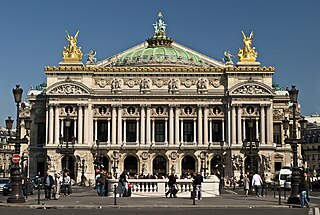
Opera is a form of theatre in which music is a fundamental component and dramatic roles are taken by singers, but is distinct from musical theatre. Such a "work" is typically a collaboration between a composer and a librettist and incorporates a number of the performing arts, such as acting, scenery, costume, and sometimes dance or ballet. The performance is typically given in an opera house, accompanied by an orchestra or smaller musical ensemble, which since the early 19th century has been led by a conductor.
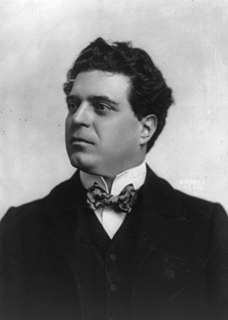
Pietro Mascagni was an Italian composer primarily known for his operas. His 1890 masterpiece Cavalleria rusticana caused one of the greatest sensations in opera history and single-handedly ushered in the Verismo movement in Italian dramatic music. While it was often held that Mascagni, like Ruggiero Leoncavallo, was a "one-opera man" who could never repeat his first success, L'amico Fritz and Iris have remained in the repertoire in Europe since their premieres.

Lombardy is one of the twenty administrative regions of Italy, in the northwest of the country, with an area of 23,844 square kilometres (9,206 sq mi). About 10 million people live in Lombardy, forming more than one-sixth of Italy's population, and more than a fifth of Italy's GDP is produced in the region, making it the most populous, richest and most productive region in the country. It is also one of the top regions in Europe for the same criteria. Milan's metropolitan area is the largest in Italy and the third most populated functional urban area in the EU. Lombardy is also the Italian region with most UNESCO World Heritage Sites—Italy having the highest number of World Heritage Sites in the world. The region is also famous for its historical figures such as Virgil, Pliny the Elder, Ambrose, Caravaggio, Claudio Monteverdi, Antonio Stradivari, Cesare Beccaria, Alessandro Volta, Alessandro Manzoni, and popes John XXIII and Paul VI.

The Teatro Reale di San Carlo, as originally named by the Bourbon monarchy but today known simply as the Teatro di San Carlo, is an opera house in Naples, Italy, connected to the Royal Palace and adjacent to the Piazza del Plebiscito. It is the oldest continuously active venue for opera in the world, having opened in 1737, decades before either Milan's La Scala or Venice's La Fenice.
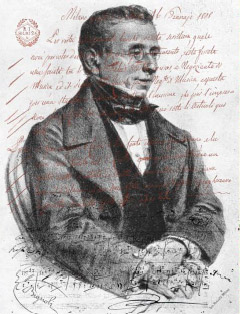
Casa Ricordi is a publisher of primarily classical music and opera. Its classical repertoire represents one of the important sources in the world through its publishing of the work of the major 19th-century Italian composers such as Gioachino Rossini, Gaetano Donizetti, Vincenzo Bellini, Giuseppe Verdi, and, later in the century, Giacomo Puccini, composers with whom one or another of the Ricordi family came into close contact.
The music of Milan has ancient roots. The Ambrosian chants are among the first codified music in Western culture, which fact led to the later development of its concept of scales, for example. In more recent history, the city of Milan has been an important social, cultural, political and commercial center not just in Italy, but in all of Europe.
Marco Tutino is an Italian composer. His emergence during the late 1970s was as the spearhead of an Italian Neo-Romantico group, founded with two other composers, Lorenzo Ferrero and Carlo Galante. He graduated from the Milan Conservatory, where he had studied flute and composition, in 1982.
Orchestra della Svizzera italiana (OSI) is a symphony radio orchestra founded in 1935 in Lugano, Switzerland.

The Teatro Dal Verme is a theatre in Milan, Italy located on the Via San Giovanni sul Muro, on the site of the former private theatre the Politeama Ciniselli. It was designed by Giuseppe Pestagalli to a commission from Count Francesco Dal Verme, and was used primarily for plays and opera performances throughout the 19th and early 20th centuries. Today, the theatre is no longer used for opera, but is a venue for concerts, plays and dance performances, as well as exhibitions and conferences.
Juan Trigos is a Mexican composer and conductor, with a career of over 25 years.
Aurelio Canonici is an Italian conductor and composer.

Susanna Rigacci is a Swedish-born Italian singer/soprano.

Stefano Miceli is an Italian classical conductor and pianist.

Having been ruled by several countries over the years, Milanese culture is eclectic and borrows elements from other countries, including Austria, Spain and France. Similarities between these places and Milan can be noticed through the language, architecture, cuisine and general culture of these countries. In the 18th century, Austrian rule stimulated much of the city's cultural, political, social and economic life, resulting in the founding of numerous important artistic institutions, as well as contributing to the city's architecture. After the unification of Italy in 1861, Milan became a major industrial and cultural centre in the new Kingdom; in the late 19th century onwards, the city held the position of the country's economic capital, whilst Rome was the seat of the government, making it the country's main political and administrative hub. In the fin-de-siècle period and the early 20th century, the city became an important architectural centre, and remained a prominent city with regard to a major intellectual scene. After World War II, Milan was highly affected by the Italian economic miracle, or il boom, and attracted a wave of immigrants from Southern Italy, who sought work in the prosperous city. By then an important centre for finance and design, the metropolis grew into a major fashion capital in the 1980s. In the 2000s Milan still remains one of the country's most important cultural, media and economic centres, regarded as the nation's second city; its prominence is extended worldwide, and it is recognised as an Alpha global city. The city additionally hosted the Expo 2015. Milan is traditionally referred to as the moral capital of Italy, especially due to the city's perceived work ethic.
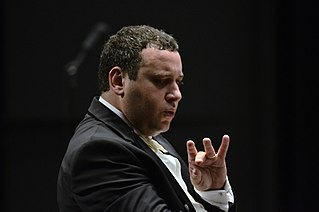
Antonino Fogliani is an Italian conductor.
Giampaolo Coral was an Italian composer.
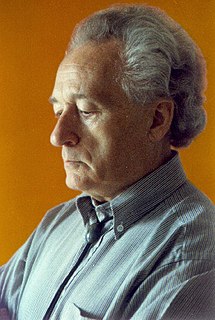
Othmar Mága was a German conductor, who was chief conductor internationally, including the Odense Symphony Orchestra in Denmark and the KBS Symphony Orchestra in Korea. Among his many recordings are several rarely played concertos for instruments such as horn and double bass, including works of the 20th century.

Gilberto Serembe is an Italian conductor and professor.

Eliodoro Bianchi was an Italian operatic tenor and later a prominent singing teacher. Born in Cividate al Piano and trained in Naples under Giacomo Tritto, he made his stage debut in 1793. Amongst the many roles he created during the course of his 40-year career were Baldassare in Ciro in Babilonia and the King of Sweden in Eduardo e Cristina, both of which were composed by Rossini expressly for Bianchi's voice. He retired from the stage in 1835 and spent his later years in Palazzolo sull'Oglio, where he died at the age of 75.
Remigio Paone (1899–1977) was an Italian journalist, theatre producer and director.













